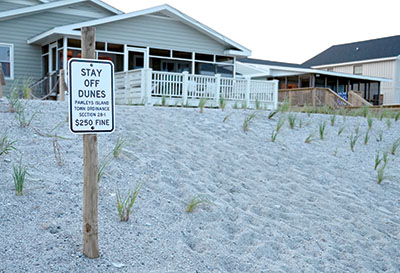Pawleys Island
Suits seek to quash condemnation for future beach renourishment

The owners of three oceanfront lots filed suit this week to block the efforts of the town of Pawleys Island to acquire easements for future beach renourishment. They say the town has acted in bad faith and violated legal procedures in condemning those easements, which they say are no longer necessary because the town has already completed its renourishment project.
The easements are needed by the town to convert a portion of its $14.3 million renourishment project into a federal project with participation by the Army Corps of Engineers. That will allow the Corps to share the cost to repair and maintain the newly-established beach and dune along 1.4 miles of the island’s south end.
The town has 110 easements from property owners in the area. They are required by the Corps and most were obtained when the town planned to carry out its renourishment project in partnership with the agency. Instead, the town decided in 2019 to fund the project on its own, both at the south end and along other portions of the beach extending past First Street on the north end.
Town Council agreed to condemn the remaining three easements in May, saying it wants to have the agreement with the Corps in place before the peak of hurricane season this fall.
The suits in Circuit Court were brought by Sunset Lodge LLC, owner of the lot at 746 Springs Ave., Frank Beattie, owner of 748 Springs, and Barry Stanton, owner of 756 Springs. Stanton, a lawyer in Columbia, is also representing the plaintiffs.
The owners ask the court to disallow and restrain the town from seeking easements because the Corps project for which they were required was never done. If there is a valid project, they still say the condemnation should be denied because the procedure was flawed and “sought under influence of legal error as to the consequences of plaintiff granting it or the town taking it,” according to the 57-page filings.
And even if the town corrects those flaws, the owners say that the easement is “overbroad” by granting public access to their property and limiting the access of the owners. “The extent of the easement sought was purposefully obscured in bad faith,” the suits claim.
Although the suits would be heard by a judge, the owners say if it is determined that their rights have been adversely affected by the completed project they want a jury trial to determine damages.
Mayor Brian Henry said he was aware of the suits, but could not comment until he had read them.
The town expects the Corps to start planting beach grass and erecting sand fence on the south end dune once the easements are obtained. That work, funded by the Corps, will allow it to claim participation in the town-funded renourishment project. If the south end beach is damaged by erosion, the Corps would pay for repairs.
Without the partnership with the Corps, the town would only get federal reimbursement for 75 percent of the cost of any repairs needed following named storms. The town borrowed $2.8 million to complete the renourishment project and has no ready source of funds for repairs of future projects.
In their suits, the three property owners call the Corps plan “a legally questionable after-the-fact scheme.”
“Proceeding on this premise is not even an attempt by the town to determine whether the scope of the proposed acquisition and the injury to the owner exceeds what is necessary for the mischaracterized ‘project,’” according to the filings.
The owners also cite comments by town officials that question the availability of Corps funding.
“Condemnation is not provided for a supposed ‘insurance policy,’ instead of for a public project,” the owners say, adding that the deal with the Corps is “more in the nature of a lottery ticket than an insurance policy.”
The owners also point out that the town has estimated that it may not need another renourishment project for 22 years, based on the annual erosion rate. The figure, provided by the project’s engineers, showed the point when the sand volume would fall below the ideal for maintaining a healthy beach.
“If the easements are not necessary, it is per se bad faith and abuse of discretion to condemn something totally unnecessary, and condemnation cannot be allowed at all,” according to the filings.
And the owners argue that the wording of the easement gives the public access “over the owner’s entire lot, or, at minimum 2 feet from the remaining portions of the owner’s house not destroyed in the course of the renourishment,” according to the suits.
The easements, filed with the county Register of Deeds, give the town or its agents the ability “to construction [sic]; preserve; patrol; operate; maintain; repair; rehabilitate; and replace; a public beach a[nd] dune system and other erosion control and storm damage reductions measured.”
The suits point out that Beattie signed a “revised easement” in 2019, which was improperly filed and later terminated because it didn’t include his revisions.
The owners say they have offered to sign more limited easements, but that has not been acknowledged by the town, which has instead “shamed and defamed the owners” for not granting the easements.




